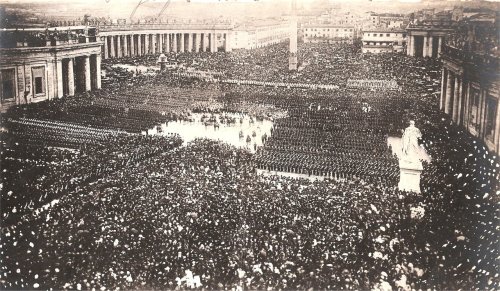The Last Inquisition — The Mortara AffairGenerally when when one thinks of the Inquisition, th
The Last Inquisition — The Mortara AffairGenerally when when one thinks of the Inquisition, the medieval Roman Catholic church comes to mind, suppressing heresy by fire or torture. Or perhaps one thinks of the Spanish Inquisition, a dark page in Spanish history where Spanish monarchs used the Inquisition to expel Jews and Muslims from Spain. Amazingly the Inquisition continued well into the mid 19th century in central Italy. Called the Papal States it was the sovereign territory of the Pope and the last bastion of the Inquisition By the 19th century most Catholic European nations had brought an end to the Inquisition in their own countries as rulers such as Napoleon I and Napoleon III favored secular governments to religious theocracy.On June 23rd, 1858, the Papal States police arrived at the home of Shlomo and Marianna Mortara, a Jewish family living in Bologna. The Mortara’s had eight children, but the police were interested in their six year old son Edguardo. Under orders from the Inquisition, Edguardo was seized and transported to Rome. Poor Edguardo would never return home again.Unbeknownst to the Mortara’s, there was a church rule that if a child was baptized a Catholic, said child could not be raised by non-Catholic parents. When Edguardo was an infant he suffered a terrible illness, one which almost took his life. Against his parents wishes and without their knowledge, a servant girl employed by the Mortara’s gave Edguardo a secret emergency baptism. Eventually the servant girl came forward to church authorities in exchange for a wedding dowry. The Inquisition investigated the claim and determined that under Catholic law Edguardo was indeed a baptized Catholic, and ordered him to be seized from the Mortara family immediately.Edguardo became a ward of the church, to be raised in Catholic doctrine and theology. Meanwhile the Mortara’s appealed vehemently for the return of their son, meeting with Pope Pius IX on several occasions. Even great European leaders such as Napoleon III and Austrian Emperor Franz Joseph demanded that Pope Pius IX return Edguardo, but all were rebuffed. The Mortara’s were forbidden from seeing their son for several weeks. After several weeks they were permitted supervised visits for short periods of time. The Mortara’s were told that the only way to have their son returned was if they converted to Catholicism, which they refused. All of the Mortara’s requests and appeals were denied. By the time Edguardo was was a legal adult he declared his intentions to remain with the Catholic Church. In 1872 he was ordained as a priest and became a member of the Augustan Order.The Mortara Affair ended badly for Edguardo’s parents, but the public outcry resulting from the event would shake the foundations of the Catholic Church and ultimately bring an end to the Inquisition forever. All over Europe the news of the affair reverberated and turned public opinion against the church. The incident was especially touted by those who supported Italian Unification. Italians called for the end of the Pope’s temporal authority and the absorption of the Papal States into a new unified Italian nation. In 1870 the French garrison of the Papal States were withdrawn to fight the Franco-Prussian War and the Italian Army stormed the city of Rome.The temporal authority of the Catholic Church was removed by the Italian government, and with it so was the power of the Inquisition. In 1929 with the Lateran Treaty the church was granted an area of 144 acres with which the Pope could claim sovereignty as an independent nation. The Office of the Inquisition became a defunct organization after 1870, with no meaningful responsibilities or duties to perform. In 1908 the Inquisition was reformed into an internal affairs organization called the Sacred Congregation of the Holy Office. Today it is known as the Congregation for the Doctrine of the Faith. -- source link
Tumblr Blog : peashooter85.tumblr.com
#history#inquisition#catholic church#mortara affair#edguardo mortara#papal states#catholicism#religion


